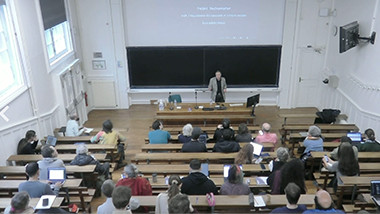
The flat and the relief : geometric material models in 19th century France
By Frédéric Brechenmacher
Appears in collection : Lattice Paths, Combinatorics and Interactions / Marches aléatoires, combinatoire et interactions
Recently several papers appears on ArXiv, on various topics apparently unrelated such as: spin system observable (T. Helmuth, A. Shapira), Fibonacci polynomials (A. Garsia, G. Ganzberger), fully commutative elements in Coxeter groups (E. Bagno, R. Biagioli, F. Jouhet, Y. Roichman), reciprocity theorem for bounded Dyck paths (J. Cigler, C. Krattenthaler), uniform random spanning tree in graphs (L. Fredes, J.-F. Marckert). In each of these papers the theory of heaps of pieces plays a central role. We propose a walk relating these topics, starting from the well-known loop erased random walk model (LERW), going around the classical bijection between lattice paths and heaps of cycles, and a second less known bijection due to T. Helmuth between lattice paths and heaps of oriented loops, in relation with the Ising model in physics, totally non-backtracking paths and zeta function in graphs. Dyck paths, these two bijections involve heaps of dimers and heaps of segments. A duality between these two kinds of heaps appears in some of the above papers, in relation with orthogonal polynomials and fully commutative elements. If time allows we will finish this excursion with the correspondence between heaps of segments, staircase polygons and q-Bessel functions.
